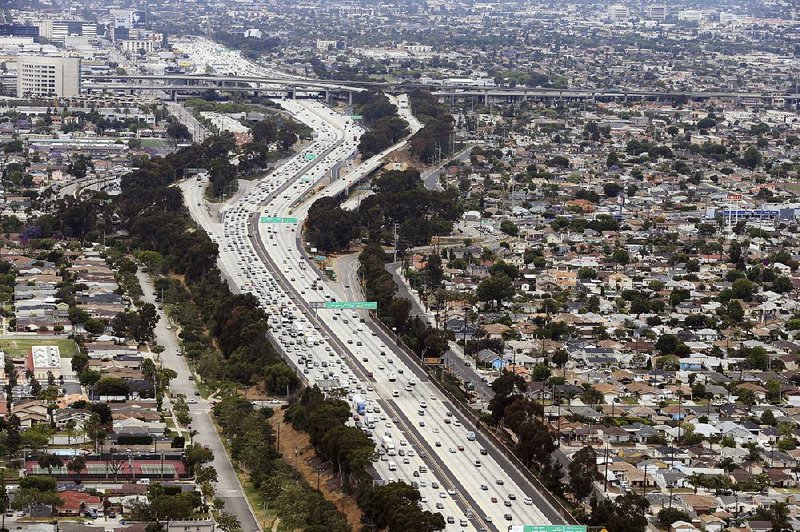President Donald Trump's administration on Thursday officially revoked California's authority to set its own emission standards, even as it warned the state that it needs to do more to combat smog.
"California has the worst air quality in the United States," Environmental Protection Agency Administrator Andrew Wheeler said Thursday at a Washington news conference, adding that tens of millions of people in the state live in areas that don't meet ambient air standards. "We hope California will focus on these issues."
Although Trump announced the move Wednesday on Twitter, it was formally unveiled Thursday during an event at EPA headquarters in front of free-market, conservative advocates, National Automobile Dealers Association officials, multifranchise owner Geoff Pohanka, and Gloria Bergquist, vice president of the Alliance of Automobile Manufacturers.
Transportation Secretary Elaine Chao said the move to revoke California's powers would reinforce the federal government's role setting vehicle standards.
[Video not showing up above? Click here to watch » https://www.youtube.com/watch?v=VZMR3TV5IEg]
"The one national program that we are announcing today will ensure that there is one -- and only one -- set of national fuel economy standards as Congress mandated and intended," Chao said. "No state has the authority to opt out of the nation's rules and no state has a right to impose its policies on everybody else in our whole country."
In its action, the Transportation Department asserts that its authority to set fuel-economy standards pre-empts California's own tailpipe standards. The EPA also is formally withdrawing a waiver that authorized California to pursue its own tailpipe greenhouse gas emission standard and zero-emission vehicle mandate, arguing both programs are prohibited by the Clean Air Act.
Chao and Wheeler framed the action as a measure to prevent California from acting as an unofficial national regulator, saying the state cannot overstep its authority to fight smog and air-pollution within its borders by regulating greenhouse gas emissions linked to climate change, a global issue.
"We will not let political agendas in a single state to be imposed on the other 49," Chao said.
The administration is still working to finalize its plan for rolling back federal fuel-economy and tailpipe emissions standards. Wheeler said those changes will "save lives and promote economic growth by reducing the price of new vehicles to help more Americans purchase newer, cleaner and safer cars and trucks."
The administration argues that the newer vehicles would cut roadway deaths by 12,700 through the 2029 model year. But The Associated Press reported last year that internal EPA emails show senior career officials privately questioned the administration's calculations, saying the proposed freeze would actually modestly increase highway fatalities, by about 17 deaths annually.
Even as the administration moved to undercut California's authority, it took pains to emphasize the state is still on the hook to clean up its auto pollution.
California officials have argued that its tailpipe emission standards are critical to helping clean up smog and satisfy national standards for ozone and air quality and have said they will fight the revocation in court if necessary.
Legal experts said the Trump administration may have a tough time defending a suit. A waiver has never been revoked in the 50-year-history of the Clean Air Act, said Julia Stein, a University of California at Los Angeles environmental law expert.
"Ironically, even though the administration insists that it will be creating 'one national standard' by revoking California's waiver, it will actually be doing the opposite," Stein wrote in a blog post.
California officials including Gov. Gavin Newsom and Attorney General Xavier Becerra said in a news conference Wednesday that the state has received roughly 100 waivers to combat air pollution and they would defend the one underpinning its vehicle rules.
"This is such a pivotal moment in the history of climate change," Newsom said, citing statistics on the role of transportation in greenhouse gas emissions. "This is our legacy moment."
With some 35 million vehicles in the state, and the transportation sector's role as the top contributor of greenhouse gas emissions, Becerra said California's ability to combat vehicle greenhouse gas emissions is critical to the state's clean-air goals.
Top California officials and environmental groups pledged legal action to stop the Trump rollback. The U.S. transportation sector is the nation's biggest single source of greenhouse gasses.
The Trump administration's changes won't take effect for another 60 days, giving state officials time to prepare a lawsuit. But the litigation will be complex and could last for years. In the meantime, California regulators in charge of reducing pollutants are considering toughening limits on refinery emissions and imposing "roadway pricing" -- which includes charging higher tolls during rush hour in the hopes of keeping cars off the road.
One California lawmaker is already working on a way to preserve at least some of the state's environmental muscle: rebates for electric cars.
"We want to be incentivizing consumers to purchase from automakers that have aligned themselves with our state's overall goals," said Democratic Assemblyman Phil Ting.
Information for this article was contributed by Ryan Beene and Jennifer A. Dlouhy of Bloomberg News and by Adam Beam and Michael Biesecker of The Associated Press.
Business on 09/20/2019
